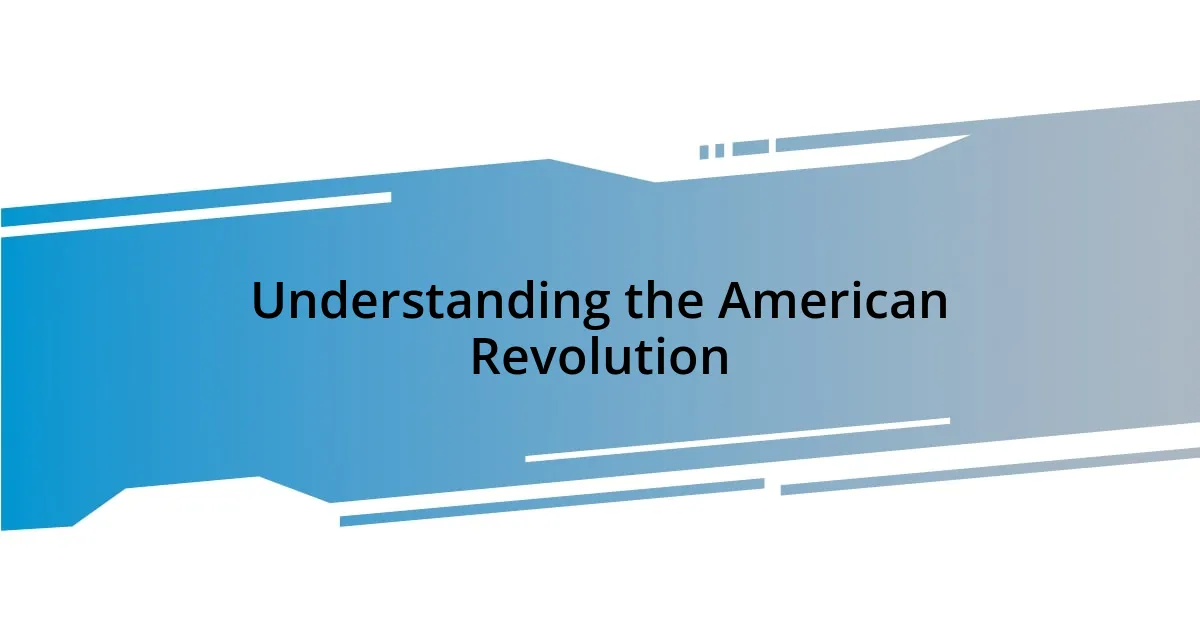Key takeaways:
- The American Revolution marked a significant shift in mindset among colonists, emphasizing personal liberty and self-determination.
- Key figures like George Washington, Thomas Jefferson, and Samuel Adams played crucial roles in inspiring and leading the revolution for independence.
- The Revolution fostered a national identity, inspired discussions on equality, and transformed economic landscapes, laying foundations for future social movements.
- Lessons learned include the importance of unity, questioning authority, and recognizing that the fight for freedom continues in contemporary society.

Understanding the American Revolution
The American Revolution was more than just a war; it was a profound shift in the collective mindset of the colonists. I often wonder what it must have felt like to stand on the brink of change, fueled by the desire for freedom and self-determination. That passion was palpable as the colonies banded together against what they perceived as oppressive rule from Britain.
One striking aspect of the Revolution was the diverse motivations behind it. For some, it was about personal liberty; for others, economic independence was crucial. I remember visiting a historical reenactment and seeing the fervor in the actors’ eyes as they recited rallying cries. It hit me then—these ideals were not just abstract concepts; they were deeply personal and often life-altering.
The role of Enlightenment thinkers in inspiring revolutionary thought can’t be overlooked. I’ve found myself reflecting on how much their ideas challenged the status quo. When reading their works, I often feel a sense of urgency and excitement, as if they were igniting the fire of change within me, urging me to question everything I’ve been told. How fascinating is it that these ideas could weave together a tapestry of rebellion and hope?

Influential Figures of the Revolution
When I think of the influential figures of the American Revolution, a few prominent names immediately come to mind. These individuals not only shaped the course of history but also ignited a passion for independence that resonated deeply within the colonies. Each played a unique role in rallying others, articulating visions of liberty, and ultimately changing the fate of a nation.
- George Washington: As the commander-in-chief of the Continental Army, he demonstrated remarkable resilience and leadership. I recall a documentary showcasing his strategic retreats, which highlighted his ability to inspire his troops even in the face of adversity.
- Thomas Jefferson: The principal author of the Declaration of Independence, Jefferson’s eloquent words helped crystallize the colonists’ aspirations for freedom. I was moved when I first read the document; its language feels almost like poetry, resonating with idealism that is still relevant today.
- Samuel Adams: Often dubbed the “Father of the Revolution,” Adams was pivotal in organizing resistance against British policies. I can almost envision the impassioned speeches he would have given in town squares, igniting fervor in the hearts of common people.
- Benjamin Franklin: His diplomatic efforts in France were crucial for obtaining support and resources. I once visited his printing shop and marveled at how a man of humble beginnings could wield such influence, all thanks to his intellect and persuasive skills.
- John Adams: As a fierce advocate for independence, Adams’ defiance set a tone for the revolutionary spirit. Reading about his arguments in favor of breaking away from Britain reminds me of the courage it takes to stand up for one’s beliefs, even when faced with overwhelming odds.
These figures, with their unique personalities and convictions, each contributed to a deeply interconnected narrative of struggle and triumph. Their stories resonate with me, as they remind us of the power of individual dedication to a cause.

Impact on American Society
The impact of the American Revolution on society was revolutionary in every sense of the word. With the defeat of British rule, individuals began to see themselves as citizens of a new nation rather than subjects of a distant empire. I often reflect on conversations I’ve had with friends about how this shift fostered a sense of identity and community, bonding people through shared ideals of liberty and democracy. This sense of belonging must have felt exhilarating.
In addition to its political implications, the Revolution initiated significant changes in social hierarchies. The notion that “all men are created equal,” though not fully realized for everyone, prompted discussions on class, race, and gender roles. I remember a poignant moment at a historical exhibit showcasing women who contributed to the war effort. It made me realize how the Revolution inspired early movements for women’s rights, laying the groundwork for future generations to challenge societal norms.
The economic landscape also transformed as new trade relationships emerged and the pursuit of independence encouraged innovation and entrepreneurship. I recall attending a local market that celebrates homemade businesses inspired by that pioneering spirit. The echo of revolution still resonates today, as individuals embrace the entrepreneurial mindset much like the early Americans did when faced with self-sufficiency for the first time.
| Impact on American Society | Details |
|---|---|
| National Identity | The Revolution fostered a sense of citizenship and unity among colonists. |
| Social Change | Ideals of equality sparked discussions on race, class, and gender roles. |
| Economic Transformation | Encouraged new trade relations and entrepreneurship reflecting independence. |

Lessons Learned from the Revolution
Understanding the lessons learned from the American Revolution sparks a contemplation of perseverance and unity. The colonists faced overwhelming odds yet found strength in their shared cause of independence. I think back to a time when I faced a daunting challenge, much like those patriots. It reminds me that solidarity can transform impossible situations into achievable victories. Have you ever felt that sense of collective strength lifting you up? It’s a powerful reminder of how people can rally together in pursuit of a common goal.
Another lesson that resonates with me is the importance of questioning authority. The Revolution encouraged individuals to think critically about their leaders and the systems in place. I vividly remember a heated debate I had with friends about the significance of civil rights today, which echoed the spirit of dissent that fueled the Revolution. It’s a reminder that progress often comes from challenging the status quo. How often do we stop to evaluate the rules governing our lives? That critical perspective can lead to necessary change.
Lastly, I’m often struck by the notion that the fight for freedom is ongoing. The Revolution set the stage for discussions about rights and liberties that persist today. I recall a community meeting where people voiced their frustrations about social injustices, and I felt a sense of history repeating itself. It made me realize that each generation faces its unique burdens in the pursuit of liberty. How do we ensure we continue to learn from past struggles while forging our paths? The Revolution teaches us that while the quest for freedom may evolve, its essence remains crucial to our identity.

Reflections on Modern Implications
Reflecting on the modern implications of the American Revolution often leads me to consider how its core principles still influence current social movements. I recall attending a rally for social justice, where the chants echoing down the streets reminded me of those revolutionary cries for freedom. How impactful is it that the same spirit urging individuals to stand up for their rights centuries ago continues to resonate through today’s activist efforts? It’s a powerful reminder of the enduring legacy of that pursuit for equality.
In terms of governance, I find myself frequently drawing parallels between the Revolution’s challenge to British authority and our current dialogues on democracy. For instance, I was struck by a recent discussion around voter suppression laws, which sparked a fire in me reminiscent of the debates over the Stamp Act. Has anything changed at all since the revolutionaries fought against taxation without representation? That historical context enriches my understanding of civic responsibility today, pushing me to advocate for policies that uphold the very ideals for which our forebears fought.
Moreover, the economic shifts initiated by the Revolution still resonate in today’s entrepreneurial spirit. I remember chatting with a small business owner about how their venture was inspired by the self-sufficiency ethos of early American settlers. It makes me wonder, what drives that desire for independence in our modern workforce? The same ingenuity and resilience that blossomed with the birth of our nation can still be seen in today’s innovators who strive to create, build, and redefine what success looks like in America.
















